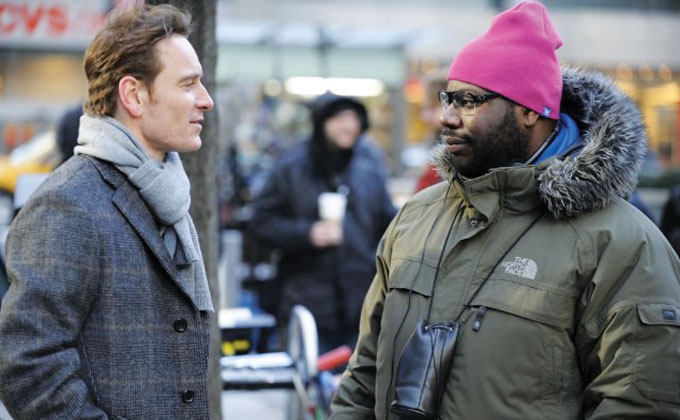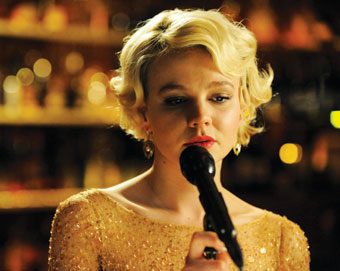Next story: International Women's Film Festival
Dirty and Down
by M. Faust

Michael Fassbender and Steve McQueen on Shame
He was named best actor at the Venice Film Festival, but Michael Fassbender’s performance as an emotionally troubled man disabled by sexual compulsions was apparently either too subtle or too disturbing for the Oscar folk, who declined to nominate him for his work in Shame, opening this week at the Amherst Theater.
(Don’t bother looking for it anywhere else: It’s rated NC-17, which means that corporate theaters won’t book it.)
A character study in the mode of 1970s American independent cinema, Shame follows Fassbender’s Brandon Sullivan, who works doing something unspecified at a Manhattan financial agency, through a week in which his routine of internet porn, prostitutes, and one-night stands is interrupted by an unexpected visit from his sister (Carey Mulligan). An aspiring singer, she has issues of her own. And the two of them have a troubled but unspecified history such that the time they spend together does neither of them any good.

Shame was directed by Steve McQueen, the British visual artist who also directed Fassbender as IRA activist Bobby Sands in the 2009 film Hunger. The two of them recently discussed the film during the Toronto Film Festival. [To McQueen] At the film’s screening you said you consider it to be as political a film as Hunger, but in a different way.
SM: Yes, because of the sexualization of images to sell anything, it’s prevalent all around us. It’s done in a very commercial way. Whether you are aware of it or not, its very prevalent. And to navigate your way through this world is difficult.
[As for pornography], access to sexual content is quite prevalent. That was the sort of starting point to explore someone who has this affliction. In my day pornography was on the top-shelf of a newsagent; it was a faraway thing. Now it’s everywhere, and therefore it has an influence on the amount of activity in a sex addict’s state.
MF: Sex is such a primal instinct that eventually some people set about to make money out of it. Everywhere you go, sex is being sold to you—you’d have to be pretty blinkered not to realize that. Whether you’re buying a soda, or even a breakfast cereal sex is being sold to you. You’re being told what to wear, how much you should weigh, or how you should look in order to be sexy, in order to be successful, in order to be accepted.
What makes [the film] special for me is the fact that audiences have responded the way they have. There is still a place for an intelligent, brave audience who will take chances and involve themselves in a film, ask questions, participate when they go to cinema as opposed to just sitting there eating popcorn and being entertained.
How do you want audiences to react to the film?
SM: I want to earn the audience’s trust. When people sit down to watch a movie they’re skeptical, but once you gain their trust they are open to what you will offer them. I always hope they come away with an experience where they feel involved, they feel a part of it. One aspect of that here the back-story to Brandon and his sister, not spelling out exactly what happened to them. I did that because that I wanted to make it…not mysterious, but actually familiar, to everyone in the audience. By not actually spelling it out, in some ways the audience are involved in what possibly it could be.
Why set this story in New York, rather than London or Paris or some other city?
SM: The research the writers did [talking to people suffering from sexual addictions], the people in New York were so open to talking about it. And you have access in New York, you can get things 24 hours a day, so to have Brandon in that environment, it’s the best place for it.
[To Fassbender] You’re involved in some fairly explicit scenes. Were those difficult to film?
MF: It’s pretty uncomfortable. It’s kind of embarrassing to be naked in front of a crew of people. But you’ve got to get over it, and just get on with it. I knew what I was getting into. [He laughs.] The most important thing is that the story is being told. These scenes describe Brandon, his state of mind, where he’s at. That was the interesting thing with the sex scenes, that it wasn’t a form of exploitation or titillation, it was really a study of this guy and his relationship with himself and his relationship with other people.
[To McQueen] How did you help him prepare for the part?
SM: It’s a little bit like jazz: You write the music, the melody, the harmony, and then within that piece of music you can improvise. There’s a roof, there’s a ceiling, certain notes can play within that space. I don’t hire robots, I hire actors, just like great players, and Michael is a great player. So you write the song and then there’s a chance for him to improvise.
MF: Great directors are great manipulators, and I think Steve is very good at that, in less obvious ways than just being on set. He basically gives me the tools to go about…kind of doing what I want, really. It’s hard to explain. Working with Steve is taking a chance, if you fall flat on your face, what is the worst that can happen? We’re all gonna die, let’s take some risks and work without the luxury of a safety net. What we thought was one idea, flip it and see what happens if you do it totally in the opposite spectrum.
There’s a lot the audience doesn’t know about Brandon’s history. Did you have any specific ideas that aren’t shown onscreen?
MF: One thing that we had discussed was that he’s a really good piano player. And it’s something he doesn’t have in his life anymore. Why? Why has he given it up? That was something interesting to draw on, that [he and his sister] had this history of music together, and for whatever reason he doesn’t want to be brought back to that memory. He abandoned that part of his life, and she sort of brings it back into his world again.
[To McQueen] Can you talk about your visual influences in the film? There appear to be traces of Kubrick, maybe Taxi Driver…
SM: When I’m setting up a shot I’m not thinking about Kubrick or Scorsese, I’m thinking about how do I do the best shot possible. I really don’t bring that to the game. I’m focusing on what’s in front of me. Any other way it just gets confusing focusing and concentrating.
Watch the trailer for Shame
blog comments powered by Disqus
|
Issue Navigation> Issue Index > v11n6 (Valentine's Day Issue, week of Thursday, February 9) > Dirty and Down This Week's Issue • Artvoice Daily • Artvoice TV • Events Calendar • Classifieds |









 Current Issue
Current Issue